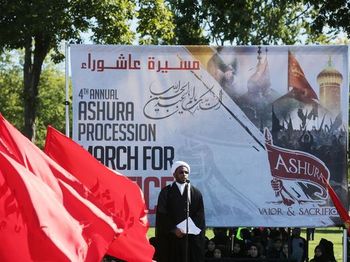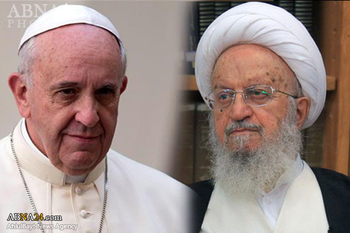The Imam was also very courageous, so much so that he had already been called “the lion of Banu Hashim.” He had participated in the wars waged by his father, the Commander of the Faithful Ali ibn Abu Talib (ﻉ), in defense of the creed against the hypocrites led by the Umayyads and against the Kharijites, proving his military ability and mastership of the art of war. Had the Muslims of today mastered this art, and had they been able to make their own weapons rather than import them from others, they would not have been forced to sell their God-given natural resources, especially oil, dirt cheap to those who do not wish them any good.
Had the rulers of the Muslim world learned how to get along with each other, they would have cooperated with each other for their own common good. Had the Muslims of the world implemented the commandments of their creed as strictly as they are supposed to, no unjust or tyrannical ruler would have ever ruled them… I think that such rulers, the likes of Yazid, are the main cause of the pathetic situation wherein the Muslims of the world find themselves at the present time, yet these rulers derive their strength from the weakness of their subjects; so, one problem is connected to the other…
Narrators of this incident record saying that there was hardly any place in al-Husayn’s body that escaped a sword stroke or an arrow, and the same can be said about his horse as-Sahab which used to belong to Prophet Muhammad (ﺹ) who, shortly before breathing his last, gave it to his right hand, cousin, and son-in-law Ali ibn Abu Talib (ﻉ). Al-Husayn’s older brother, Imam al-Hassan (ﻉ), inherited it; after his martyrdom, it became the property of Imam al-Husayn (ﻉ).
Having become too feeble to fight, he stood to rest. It was then that a man threw a stone at him, hitting his forehead and causing his blood to run down his face. He took his shirt to wipe his blood from his eyes just as another man shot him with a three-pronged arrow which pierced his chest and settled in his heart. He instantly said, “In the Name of Allah, through Allah, and on the creed of the Messenger of Allah [do I die].” Raising his head to the heavens, he said, “Lord! You know that they are killing a man besides whom there is no other son of Your Prophet’s daughter.” As soon as he took the arrow out of his back, blood gushed forth like a drain pipe. He placed his hand on his wound and once his hand was filled with blood, he threw it above saying, “Make what has happened to me easy for me; it is being witnessed by Allah.”
Not a single drop of that blood fell on the ground. Then he put it back a second time, and it was again filled with blood. This time he rubbed it on his face and beard as he said, “Thus shall I appear when I meet my Lord and my grandfather the Messenger of Allah (ﻉ), drenched in my blood. It is then that I shall say: O grandfather! So-and-so killed me.’”
Bleeding soon sapped his strength, so he sat down on the ground, feeling his head being too heavy. Malik ibn an-Nisr noticed his condition, so he taunted him then dealt him a stroke with his sword on the head. Al-Husayn (ﻉ) was wearing a burnoose which soon became full of blood. Al-Husayn (ﻉ) said, “May you never be able to eat or drink with your right hand, and may Allah gather you among the oppressors.” Having said so, the dying Imam threw his burnoose away and put on a turban on top of his capuche cap.
Hani ibn Thabeet al-Hadrami has said, “I was standing with nine other men when al-Husayn (ﻉ) was killed. It was then that I looked and saw one of the children from al-Husayn’s family wearing a robe and a shirt, and he was wearing two ear-rings. He held a post from those buildings and stood startled looking right and left. A man came running. Having come close to that child, the man leaned from his horse and killed that child with his horse. When he was shamed for thus killing a helpless child, he revealed his last name…”
That child was Muhammad ibn Abu Sa’d ibn Aqeel ibn Abu Talib. His mother, dazed, stunned, and speechless, kept looking at him as the incident unfolded before her very eyes…
The enemies of Allah waited for a short while then returned to al-Husayn (ﻉ) whom they surrounded as he sat on the ground unable to stand. Abdullah son of Imam al-Hassan (ﻉ), grandson of the Prophet (ﺹ), who was eleven years old, looked and saw how his uncle was being surrounded by those people, so he came running towards him. Zainab, al-Husayn’s revered sister, wanted to restrain him but he managed to evade her and to reach his uncle.
Bahr ibn Kab lowered his head to strike al-Husayn (ﻉ), so the child shouted, “O son of the corrupt woman, are you going to strike my uncle?” The man dealt a blow from his sword which the child received with his hand, cutting it off. The child cried in agony, “O uncle!” Then he fell in the lap of al-Husayn (ﻉ) who hugged him and said, “O son of my brother! Be patient with regard to what has befallen us, and consider it as goodness, for Allah, the most Exalted, will make you join your righteous ancestors.” Then he raised his hands and supplicated saying, “O Allah! Let them enjoy themselves for some time then divide them and make them into parties, and do not let their rulers ever be pleased with them, for they invited us to support us, then they turned their backs to us and fought us.”
Harmalah ibn Kahil shot the child with an arrow, killing him as he sat in his uncle’s lap.
Al-Husayn (ﻉ) remained lying on the ground for some time. Had those rogues wished to kill him, they could have done so, but each tribe relied on the other to do what it hated to do itself. Ash-Shimr shouted, “What are you standing like that for?! What do you expect the man to do since your arrows and spears have wounded him so heavily? Attack him!”
Zarah ibn Shareek struck him on his left shoulder with his sword while al-Haseen shot him with an arrow which penetrated his mouth; another man struck him on the shoulder. Sinan ibn Anas stabbed him in his collar bone area of the chest then shot him with an arrow in the neck. Salih ibn Wahab stabbed him in the side…
قال هلال بن نافع: كنت واقفاً نحو الحسين وهو يجود بنفسه ، فوالله ما رأيت قتيلاً قطّ مضمّخاً بدمه أحسن منه وجهاً ولا أنور ، ولقد شغلني نور وجهه عن الفكرة في قتله . فاستقى في هذه الحال ماء فأبوا ان يسقوه . وقال له رجل : لا تذوق الماء حتّى ترد الحامية فتشرب من حميمها . فقال عليه السّلام : ((أنا أرد الحامية ؟! وإنّما أرد على جدّي رسول الله وأسكن معه في داره في مقعد صدق عند مليك مقتدر وأشكو إليه ما ارتكبتم منّي وفعلتم بي). فغضبوا بأجمعهم حتّى كأنّ الله لَم يجعل في قلب أحدهم من الرحمة شيئاً.
Hilal ibn Nafi` has said, “I was standing in front of al-Husayn (ﻉ) as he was drawing his last breath. Never did I ever see anyone whose face looked better or more glowing as he was stained with his own blood! In fact, the light emanating from his face distracted me altogether from the thought of killing him! As he was in such a condition, he asked for some water to drink, but they refused to give him any.”
A man said to him, “You shall not taste of water till you reach hell from whose hot boiling water shall you drink.” He, peace be with him said, “Am I the one who will reach it? Rather, I will reach my grandfather the Messenger of Allah (ﻉ) and reside with him in his abode of truth near an Omnipotent King, and I shall complain to him about what crimes you committed against me and what you have done to me.” They all became very angry. It is as if Allah did not leave an iota of compassion in their hearts. When his condition worsened, al-Husayn (ﻉ) raised his eyes to the heavens and said,
“O Allah! Sublime You are, Great of Might, Omnipotent, Independent of all creation, greatly Proud, Capable of doing whatever You please, Forthcoming in mercy, True of Promise, Inclusive of Blessings, Clement, Near to those who invoke Him, Subduing His creation, Receptive to Repentance, Able, Overpowering, Appreciative when thanked, Remembering those who remember Him! Thee do I call upon out of my want, and Thee do I seek out of need! From Thee do I seek help when in fear and cry when depressed! Thine help do I seek in my weakness, and upon Thee do I rely! O Allah! Judge between us and our people, for they deceived and betrayed us. They were treacherous to us, and they killed us although we are the Itrat of Your Prophet and the offspring of the one You love: Muhammad (ﺹ) whom You chose for Your Message and entrusted with the revelation. Do find an ease for our affair and an exit, O most Merciful of all merciful ones! Grant me patience to bear Your destiny, O Lord! There is no Allah but You! O Helper of those who seek help! I have no Allah besides You, nor do I adore anyone but You! Grant me to persevere as I face Your decree, O Helper of the helpless, O Eternal One Who knows no end, O One Who brings the dead back to life, O One Who rewards every soul as it earned, do judge between me and them; surely You are the best of judges.”
KARBALA AND BEYOND


